Hey, readers, I started this as my review of No Strings Attached, but it became something greater, so it is a review of that, but mostly in passing and near the end. As I am more interested in writing about the genre than the film itself, I’ll give you my star rating, and talk about the film intermittently, but there you go.
ON ROMANTIC COMEDIES AND NO STRINGS ATTACHED
The problem with romantic comedies is partly the nature of cinema. For most of us, relationships are defined by attraction and then functionality. These are sometimes mutually exclusive: sometimes the people we want to fuck are a hot mess to deal with, and sometimes the people we’re most comfortable with offer no sexual thrills. Attraction is inherently cinematic but can only be drawn out so long, while showing how a relationship works is probably best left for television than a two hour narrative. Even when people “meet cute” in real life, generally the obstacles that keep them apart are easy fixes or are ultimately too great to hurdle but – at the very least – are generally not that funny. If you are married and meet someone you like better, then that’s not that amusing. Such is why great romance narratives use world events as a backdrop, or use great tragedies (like Titanic or Remember Me) to heighten the immediacy. Sometimes you meet someone and there’s that passionate flame, but then there’s the after, and the after is hard to turn into a three-act structure without a dilemma.
Rom-coms usually have very silly obstacles and it’s difficult to show the relationships after the two leads have had sex because then there is a level of acceptance (especially in Rom-com films pre-1970) that negates the rest of the narrative. This is partly because sex was considered reserved for marriage (at least in movies), but even without marriage, once sex is introduced it’s hard to find a better ending. In real life sex is usually a dividing line of seriousness or something that comes early, which is why setting a film in high school (even that gets dicey now), or in a workplace (like The Office) can add some juice to explain why the two leads aren’t already jumping in the sack and calling themselves exclusive. No Strings Attachedhas a semi-solution to that problem, but it also shows the weird chemistry that is involved with making a good love story.
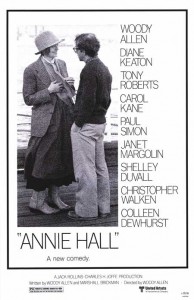 Most films in the rom-com genre find the most strained ways to keep their perfect couples from fucking (which is usually the closer). That’s generally why the best relationship comedies aren’t about meeting and falling in love. Annie Hall is the ultimate example, but melancholy doesn’t really go hand in hand with films starring Kate Hudson or Katherine Heigl. Some of the best love stories are buried within genre work (like – as I’ve said before – the films of Edgar Wright, all of whose films could be describes as rom-coms), which often create an obstacle greater than the clichéd Baxter character. “I will become a man for you by standing up to zombies” is – in its way – usually more interesting than “she thought we were second cousins” or “she thought I was married,” etc. But to that end, Rio Bravo can be typed a romantic comedy. If we remove genre efforts, the object of all romantic comedies is to find a believable obstacle that keeps two attractive people from each other long enough so they get to know each other and we believe they could be happy together, if only.
Most films in the rom-com genre find the most strained ways to keep their perfect couples from fucking (which is usually the closer). That’s generally why the best relationship comedies aren’t about meeting and falling in love. Annie Hall is the ultimate example, but melancholy doesn’t really go hand in hand with films starring Kate Hudson or Katherine Heigl. Some of the best love stories are buried within genre work (like – as I’ve said before – the films of Edgar Wright, all of whose films could be describes as rom-coms), which often create an obstacle greater than the clichéd Baxter character. “I will become a man for you by standing up to zombies” is – in its way – usually more interesting than “she thought we were second cousins” or “she thought I was married,” etc. But to that end, Rio Bravo can be typed a romantic comedy. If we remove genre efforts, the object of all romantic comedies is to find a believable obstacle that keeps two attractive people from each other long enough so they get to know each other and we believe they could be happy together, if only.
Bringing up the Baxter, it’s worth delving into that cliché. The Baxter was defined by the film The Baxter, which had Michael Showalter playing a character with numerous perfect women, but always left for the “better man.” The archetypal Baxter is Bill Pullman’s character in Sleepless in Seattle, but this character exists in a lot of movies as both men and women. The problem with a Baxter is that the film needs to dismiss them, and if it shows a powerful or interesting man or woman with an asshole, a doormat or a loser, it also dings your sympathy for them. In You’ve Got Mail, Tom Hanks is dating Parker Posey and at no point do believe they would be together. Then you’ll have one like Bradley Cooper in The Wedding Crashers, who pretends to be a nice guy. But – again – the problem with that is it suggests the female lead doesn’t know the real person they’re dating. Romantic comedies rarely have the time or interest to make it about a real struggle to abandon this person, and though being in a bad relationship or dysfunctional one is commonplace, it’s hard to make that cinematic without dinging your character’s sympathy. One of the best movies about this is Ernst Lubitsch’s Trouble in Paradise, where both women the male character has to chose from are worthy of his affections. But then also being alone is awkward because it suggests the character is not currently sexually successful, and/or desirable.
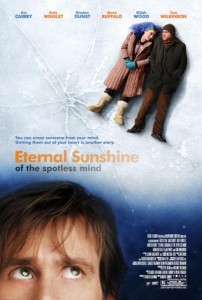 The best romantic comedies tend to fuck with the formula in interesting ways, either by playing on role reversal (like The 40-Year-Old Virgin), or by diluting the saccharine (like The Apartment or Eternal Sunshine of the Spotless Mind). The genre is mostly a ghetto, but a lot of the greatest filmmakers have made them and the one’s that work best don’t come from a bullshit place. On the commentary for Say Anything, Cameron Crowe talks about how John Cusack brought a darkness to his character, and it may explain why it’s still one of (if not the) best things he’s ever done.
The best romantic comedies tend to fuck with the formula in interesting ways, either by playing on role reversal (like The 40-Year-Old Virgin), or by diluting the saccharine (like The Apartment or Eternal Sunshine of the Spotless Mind). The genre is mostly a ghetto, but a lot of the greatest filmmakers have made them and the one’s that work best don’t come from a bullshit place. On the commentary for Say Anything, Cameron Crowe talks about how John Cusack brought a darkness to his character, and it may explain why it’s still one of (if not the) best things he’s ever done.
And what’s interesting about modern romantic comedies is that they usually come from a place of complete and utter bullshit. They are removed from those sorts of pain, even if they mostly come with a musical montage when the female or male lead blows it. Let’s take a film like Failure to Launch. The premise of the film is that Mathew McConaughey (how’s it going) is a successful guy who lives with his parents. Right there, the film is harder to swallow than Peter Parker designing his own web-shooters. But then Sarah Jessica Parker plays a woman whose job it is to help men like him to find their way out of their parents’ house. I guess metaphorically, the idea that a number of men are grown-up boys is a good start for a romantic comedy, but the film throws anything resembling reality out the window. And for set pieces, you have a scene in a film like The Ugly Truth, where a young child finds the controls of the vibrating panties that Katherine Heigl is wearing. So basically she’s being raped or sexually assaulted by an underage boy. Something I’m sure most viewers can relate to. But this is also escalation of the new sensibilities, and trying to find the new “I’ll have what she’s having” is a hard business.
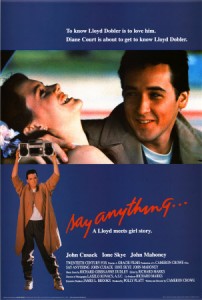 But that said – so many things in mainstream romantic comedies that are considered charming or romantic could lead to a restraining order. This cuts both ways – Amelie is either a slice of whimsy or a movie about a sociopathic women who doesn’t enjoy sex and likes to interfere in other people’s lives. Cinema Paradiso used standing outside a woman’s window every night as proof of an everlasting love. Lloyd Dobler shows up outside his ex-girlfriend’s house and to make her reconsider their break-up plays the song that played during their first sexual encounter. These things are romantic when the two parties love each other. But if they don’t…
But that said – so many things in mainstream romantic comedies that are considered charming or romantic could lead to a restraining order. This cuts both ways – Amelie is either a slice of whimsy or a movie about a sociopathic women who doesn’t enjoy sex and likes to interfere in other people’s lives. Cinema Paradiso used standing outside a woman’s window every night as proof of an everlasting love. Lloyd Dobler shows up outside his ex-girlfriend’s house and to make her reconsider their break-up plays the song that played during their first sexual encounter. These things are romantic when the two parties love each other. But if they don’t…
One of the biggest romantic comedies of the last twenty five years involved Julia Roberts playing a hooker, so perhaps the appeal of these sorts of films for a modern audience is their complete bullshitiness. Figures of romantic allure like Robert Patinson or Richard Gere may seem unattainable to the lady in accounts receivable, so saddling the narrative with real world problems only conflates the dissonance of a masturbatory fantasy (it adds zippers to the zipless fuck). Some men may aspire to be Spider-Man like some women aspire to be Kristen Stewart in Twilight. The core truth (doing good, being loved) is not clouded by the things we cannot be. But the modern skewing of these male fantasies is toward more and more realism and darkness, where the modern feminine fantasy has become in mainstream cinema less realistic. Or perhaps part of it is that these are considered date films, and there’s nothing less appealing than being on a date and having your problems reflected back on you.
It’s interesting that men have in some ways co-opted the genre in that a lot of films that cast schlubby men in the romantic leading role, though this may have more to do with modern living. Men like love stories as well, and so a rotund Seth Rogen or a sexless 40-year-old man become the male avatars. Even something like Notting Hill suggests that the fantasy is more for the male character than the female (though Julia Roberts is playing the polar opposite of her character in Pretty Woman). These films speak to male insecurities about attractiveness and experience. There have been few – if any – plump female romantic comedies, and generally they star Toni Collette. The Farrelly brothers tried to wrestle with this, but ultimately failed in Shallow Hal. But – for whatever reason – the more male versions of these sorts of movies are usually the one’s championed, be it the work of Judd Apatow, or There’s Something about Mary. In these cases it’s the men who are the ugly ducklings, but the sappiness is diluted by profanity and more explicit sexual talk (but the films themselves have become relatively sexless). And such may be why Elizabeth Meriwether’s script for No Strings Attached is peppered with profanity and the – now expected – somewhat filthier sex talk. But – like so many of these films – there’s not a lot of lust. When you watch a film like The Lady Eve that Henry Fonda wants to have sex with Barbara Stanwyck is unquestionable. Or Ball of Fire (one of my favorite films in the history of ever), Gary Cooper definitely wants Stanwyck’s sexual attentions. Whereas when I watch something like No Strings Attached, I don’t know if I really believe either actor wants to make hot monkey love, and if I give Twilight credit for anything, it’s that Kristen Stewart definitely seems hot to trot for her leading man in the film (which may be the ultimate sign of acting).
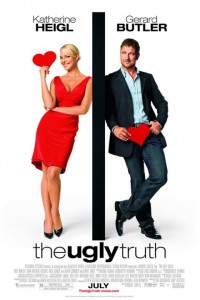 The funniest thing for me in the watching of No Strings Attached was talking to a number of female colleagues when the film was over. The premise of No Stringsis that Natalie Portman and Asthon Kutcher’s characters decide to become fuck-buddies (the film’s original title), who just have sex but aren’t supposed to be committed to each other. Kutcher shows up at her place after a bender caused by his ex girlfriend dating his father (Kevin Kline). He wakes up on the couch and then moves to her bedroom where she suggests they get to the fucking with a less than two minute insert-to-complete timeline.
The funniest thing for me in the watching of No Strings Attached was talking to a number of female colleagues when the film was over. The premise of No Stringsis that Natalie Portman and Asthon Kutcher’s characters decide to become fuck-buddies (the film’s original title), who just have sex but aren’t supposed to be committed to each other. Kutcher shows up at her place after a bender caused by his ex girlfriend dating his father (Kevin Kline). He wakes up on the couch and then moves to her bedroom where she suggests they get to the fucking with a less than two minute insert-to-complete timeline.
“Imagine what he’d smell like?”
“Terrible. I keep breath mints near my bed so it isn’t gross to kiss in the morning.”
“Also, he’d been drinking all night. I would be shocked at his… readiness.”
“Or hers.”
“Sandpaper.”
“And who would that be good for? You’ve just proved that he can pop quick.”
Funnily enough I didn’t mind the scene as much as the women did, but I understood their points. For me the moment I was turned against the film happens early. The film has about three prologues, with the two leads meeting as children, then in college, and then in current times before Kutcher’s night of debauched drinking. In the college setting, we’re introduced to the four main characters, with Kutcher and Portman hanging out with their friends who also are their BFF’s a couple years later. Greta Gerwig plays the female best friend, and she’s supposed to be the antithesis of Portman’s character in her way (that is to say, in a vaguely defined sense that may have been left on the cutting room floor), and is the more slutty of the two. But her character is introduced wearing shorts that say “whore.” It was a moment I felt shame for the actress, her character, and everyone involved.
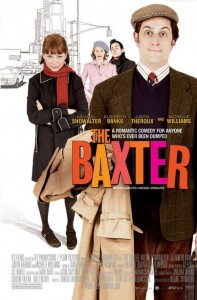 Oh well. From there the film sets up about its premise (these two have sex and then fall in love), but then it also establishes a vague threat in a male Baxter. You know you’re not with the film when you think that guy has a point. He’s a coworker who tells Kutcher that he’s just an empty headed prat who she’ll fuck for a while until she realizes that Kutcher’s a loser. and he’s a doctor. Since Portman wants a relationship with someone who understands she works 80 hours a week, he’s got a point and Kutcher’s character denies that he’s had his life handed to him, but seems to have gotten his job because of his father. This is made less sympathetic by his desire to be a writer – but a writer for the show he’s on, which appears to be a High School Musical clone. For people in the industry this might make more sense than for those not. Often getting started means working on things you might normally not, but the film doesn’t build that in any reasonable way, so his real goal appears to be writing for a Disney/Nickelodeon type show.
Oh well. From there the film sets up about its premise (these two have sex and then fall in love), but then it also establishes a vague threat in a male Baxter. You know you’re not with the film when you think that guy has a point. He’s a coworker who tells Kutcher that he’s just an empty headed prat who she’ll fuck for a while until she realizes that Kutcher’s a loser. and he’s a doctor. Since Portman wants a relationship with someone who understands she works 80 hours a week, he’s got a point and Kutcher’s character denies that he’s had his life handed to him, but seems to have gotten his job because of his father. This is made less sympathetic by his desire to be a writer – but a writer for the show he’s on, which appears to be a High School Musical clone. For people in the industry this might make more sense than for those not. Often getting started means working on things you might normally not, but the film doesn’t build that in any reasonable way, so his real goal appears to be writing for a Disney/Nickelodeon type show.
If there’s one thing that No Strings gets mostly right is how digital technology has changed everything. These are characters who text. And if I’m not satisfied by the end product, it’s at least fair to say that the film recognizes the current dating landscape where texting is way more prevalent than – in a lot of cases – talking on the phone, and where a text message has both a timeline, but a long editing session. Personally, other than my immediate family members, I’m more likely to text or Skype than call these days, especially in the exploratory period.
But though there’s a Baxter-y threat, the main thing that keeps the two characters apart is the fact that Natalie Portman’s character is insane. This isn’t necessarily in the text, but her reasons for breaking up and wanting the relationship the way it is are barely explained at best. I guess it’s because she’s a career-driven woman, but the problem is that – at a certain point in the film before the two break up and before their end reunion (spoilers?) – she all but says that she loves him. Kutcher’s character is in love with her from the start and puts up with her shit, and it only takes situations like him taking two women home after she suggests that they see other people, or later another woman after she’s ended it for her to figure out he’s a keeper. At a certain point I would have been happier if the film didn’t end up with them together, because – as Robert De Niro would say – she had her shot and she BLLEWWWW it. Forgiveness is romantic in its way, but there’s a point where if someone doesn’t understand that you love them, or they can’t reciprocate when comforted with dead-on feelings, I don’t understand sticking around. At least cinematically. But Portman’s (and by default their) biggest obstacle is that she’s nuts. Take it back, maybe this does speak to certain truths. No wait, it doesn’t.
The other big problem in the film is that their obstacle is no obstacle, so they spend the middle of the film basically having a great time together, and acting like they’re in love, so there’s about zero dramatic tension. If you’re fucking and go on romantic dates, then you’ve removed any sense of escalation, because cinematically they spend all their time together. They’re – in the film’s terms – clicking, and that’s all we see, so okay, what’s the problem? The problem is that she just wants to be fuck-buddies, but doesn’t understand that sex has an emotional component that comes from hanging out with each other? This would be a better film if someone said that Portman’s character had Aspbergers, because the problem with their relationship is an ill-defined sense of definition, whereas the human condition is usually contingent on malleability. Or, to quote someone else, “life is what happens when you’re busy making plans.” The film doesn’t do a very good job explaining why Portman’s character doesn’t want attachment after it appears she is mostly attached.
To that end, director Ivan Retiman and company pepper the film with a number of great female actresses and waste them. Lake Bell plays one of Kutcher’s coworkers, Abby Elliot plays a bisexual – possibly lesbian – waitress, Mindy Kahling and Greta Gerwig play two of Portman’s housemates, Jennifer Irwin (of Eastbound and Down) plays a bitchy boss, and Olivia Thirlby plays Portman’s sister. The film has much stronger females, though Ludacris does have a funny line or two, and Kevin Kline is way too good as the hippy, drug taking father. Kline is encased in Teflon in the film, he gets to show up and do what he wants. Reitman at this point hasn’t made a great film in fifteen years (I’ll give him Dave), and he’s not really on his game in this film, but in a lot of ways the film feels more like the product of Meriwether, or at least she seems more like the driving force. Perhaps that’s the publicity, or the sense that Reitman likely doesn’t text as much. It’s funny that Meriwether comes from Diablo Cody’s posse (no jokes) because Juno is a way better textured romantic comedy. This film is mostly harmless, but the premise of dealing with how people often fall for each other after they’ve had sex is a great place to start, as is a film that at least tries to attempt to deal with sex in more modern terms. But, ultimately, this feels like a strong pitch-based premise that never cracked the film’s conceit. Which seems to the number one problem with genre: They find some convoluted excuse for people who are going to fall in love to have difficulties, but it rarely feels real because the conceit is inorganic.








